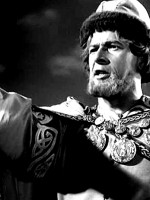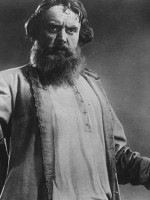Nikolai Virta est un Scénariste né le 19 décembre 1906

Nikolai Yevgenyevich Virta (Russian: Никола́й Евге́ньевич Вирта́) (real name Karelsky) (December 19 1906 - January 3, 1976) was a Soviet writer who developed the theory of "conflictless" drama.
In 1943 Joseph Stalin decided to allow publication of the Bible in Russia, and Virta was chosen as the censor for the project; he decided there were no deviations from Communist ideology and passed it without alteration. In 1954, as the result of a scandal, he was excluded from the Writers' Union, but he was reinstated in 1956.
In describing the "nadir of the Soviet theatre" between World War II and the death of Stalin, Michael Glenny writes:
Matters reached the depth of absurdity when one of the most compliant Stalinist playwrights, Nikolay Virta, propounded the theory of 'lack of conflict'. According to this, the only possible basis of drama for a Soviet play was the struggle between the 'good' and the 'better'. The resulting plays were so abysmal that even the party was forced to disown them.
Kornei Chukovsky described Virta as follows in his diary entry for October 19, 1941:
But morally suspect as he is, there is something endearing about him: he hasn't read a thing and doesn't care for poetry, music, or nature, yet he is hardworking, tireless in his machinations (and not only when they're for his own good), not without literary ability (some of his newspaper reports are very well written). It's just that he's a predatory type by nature. He adores things—fancy clothes, fine furniture, rich food—and power.
Source : Wikidata
Nikolai Virta

- Infos
- Photos
- Meilleurs films
- Famille
- Personnages
- Récompenses
Naissance 19 décembre 1906
Mort 3 janvier 1976 (à 69 ans) à Moscou (Russie)
Récompenses Ordre de Lénine, Prix Staline, Médaille pour la victoire face à l'Allemagne dans la grande guerre patriotique de 1941-1945
Mort 3 janvier 1976 (à 69 ans) à Moscou (Russie)
Récompenses Ordre de Lénine, Prix Staline, Médaille pour la victoire face à l'Allemagne dans la grande guerre patriotique de 1941-1945
Biographie
Nikolai Virta was born in the village of Bolshaya Lazovka near Tambov, into the family of a village priest who was shot in 1921 as a supporter of Aleksandr Antonov. From 1923 he worked as a reporter for newspapers and radio, and from 1930 he lived in Moscow. He won fame with his 1935 novel Odinochestvo (Alone), which he used as the basis for his play Zemlya (Earth, 1937). He was awarded the Stalin Prize for the novel in 1941, as he was for his plays Khleb nash nashushchny (Our Daily Bread) in 1948 and Zagovor obrechennykh (Conspiracy of the Condemned, a "virulently anti-American drama") in 1949 and for his script for the film Stalingradskaya bitva (The battle of Stalingrad) in 1950. He later turned his 1956 novel Krutye gory (Steep Hills) into the play Dali dal'nye, ne oglyadnye (1957).In 1943 Joseph Stalin decided to allow publication of the Bible in Russia, and Virta was chosen as the censor for the project; he decided there were no deviations from Communist ideology and passed it without alteration. In 1954, as the result of a scandal, he was excluded from the Writers' Union, but he was reinstated in 1956.
In describing the "nadir of the Soviet theatre" between World War II and the death of Stalin, Michael Glenny writes:
Matters reached the depth of absurdity when one of the most compliant Stalinist playwrights, Nikolay Virta, propounded the theory of 'lack of conflict'. According to this, the only possible basis of drama for a Soviet play was the struggle between the 'good' and the 'better'. The resulting plays were so abysmal that even the party was forced to disown them.
Kornei Chukovsky described Virta as follows in his diary entry for October 19, 1941:
But morally suspect as he is, there is something endearing about him: he hasn't read a thing and doesn't care for poetry, music, or nature, yet he is hardworking, tireless in his machinations (and not only when they're for his own good), not without literary ability (some of his newspaper reports are very well written). It's just that he's a predatory type by nature. He adores things—fancy clothes, fine furniture, rich food—and power.
Le plus souvent avec
Filmographie de Nikolai Virta (1 films)
Scénariste

La bataille de Stalingrad (1949)
, 2h54Réalisé par Vladimir Petrov
Genres Drame, Guerre, Action, Historique
Thèmes Politique
Acteurs Aleksei Dikij, Nikolai Cherkasov, Vasili Merkuryev, Viktor Khokhryakov, Boris Livanov, Nikolai Plotnikov
Note60%





Sorti quatre ans après la fin de la Seconde Guerre mondiale, cet épopée de propagande soviétique retrace la bataille titanesque de l'armée russe contre les envahisseurs nazis, tout en mettant en lumière le leader désormais déifié, Joseph Staline, en tant que principal responsable de la défaite allemande.
 Connexion
Connexion



